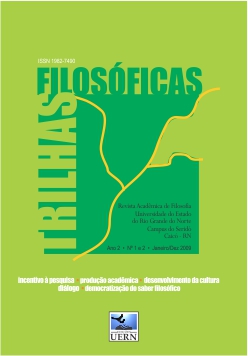A metafísica e suas margens:
a diferença entre Heidegger e Derrida
Keywords:
Metaphysics, Language, DifferenceAbstract
Heidegger, in Being and Time, explains his ideas about the destruction of metaphysics. Based on the concept of ontological difference, he identifies that philosophy has historically made the mistake of interpreting the Being as simple objective presence. The difficulty that arises is how to use language (with its metaphysical categories) to talk about the Being from a non-metaphysical perspective. Derrida, who argues that the ontological difference is the result of metaphysical thought, offers another perspective. For him, Heidegger stays at the traditional binary Being-entities, maintaining the hierarchy in which the Being"™s question is considered the most essential. Derrida then created the notion of différance, more original and arch-structural than ontological difference. In this sense, older than the Being, the différance would not have a name in language; rather, it could not be designated in language. However, is Derrida not trying to talk about this "˜unnamable"™ throughout his writings? The limitation is the language itself as well. Is philosophy possible without metaphysics? The article aims to discuss the limits of the criticism on metaphysic. We suggest that the criticism is possible only in the strict differences in thought.
Downloads
References
BIYOGO, G. Adieu à Jacques Derrida: enjeux et perspectives de la déconstruction. Paris: L"™Harmattan,, 2005. 160 p.
CAPUTO, J. Por amor í s coisas mesmas: o hiper-realismo de Derrida. In: DUQUE-ESTRADA, P. C. (Org). Às margens: a propósito de Derrida. Rio de Janeiro: Loyola; PUC, 2002. p. 29-48.
CARVALHO, C. Para compreender Saussure. Petrópolis: Vozes, 2002. 192 p.
DERRIDA, J. A diferença. In: DERRIDA, J. Margens da filosofia. Campinas: Papirus, 1999a. p. 33-63.
DERRIDA, J. Gramatologia. São Paulo: Perspectiva, 1999b. 386 p.
DUQUE-ESTRADA, P. C. Derrida e a escritura. In: DUQUE-ESTRADA, P. C. (Org). Às margens: a propósito de Derrida. Rio de Janeiro: Loyola; PUC, 2002. p. 928.
HEIDEGGER, M. De camino al habla. Barcelona: Odós, 1969. 193 p.
HEIDEGGER, M. Sobre o Humanismo. Rio de Janeiro: Tempo Brasileiro, 1987. 68 p.
HEIDEGGER, M. Ser e Tempo. Petrópolis: Vozes, 1993. 598 p.
INWOOD, M. Dicionário Heidegger. Rio de Janeiro: J. Zahar, 2002. 244 p.
MICHELAZZO, J. C. Do um
como princípio ao dois como unidade. São Paulo: FAPESP/Annablume, 1999. 239 p.
NUNES, B. Passagem para o poético: filosofia e poesia em Heidegger. São Paulo: Ática, 1992. 304p.
PECORARO, R. R. Niilismo, metafísica, desconstrução. In: DUQUE-ESTRADA, P. C. (Org). Às margens: a propósito de Derrida. Rio de Janeiro: Loyola; PUC, 2002. p. 49-72.
STEIN, E. Diferença e metafísica: ensaios sobre a desconstrução. Porto Alegre: EdPUCRS, 2000. 293 p.
VATTIMO, G. As aventuras da diferença: o que significa pensar depois de Heidegger e Nietszche. Lisboa: Edições 70, 1980. p.143-160.
VATTIMO, G. Introdução a Heidegger. Lisboa: Edições 70, 1989. 210 p.
ZANELLO, V. A linguagem poética em Heidegger. Educação e Filosofia, UFU, v. 18, jan.-dez., p. 279-310, 2004.
ZARADER, M. Heidegger e as palavras da origem. Lisboa: Instituto Piaget, 1990. 416 p
Downloads
Published
How to Cite
Issue
Section
License
DECLARAÇíO DE DIREITO AUTORAL
1 Ao submeter trabalhos í revista Trilhas Filosóficas, caso este seja aprovado, o autor autoriza sua publicação sem quaisquer ônus para a revista ou para seus editores.
2 Os direitos autorais dos artigos publicados na Trilhas Filosóficas são do autor, com direitos de primeira publicação reservados para este periódico.
3 Fica resguardado ao autor o direito de republicar seu trabalho, do modo como lhe aprouver (em sites, blogs, repositórios, ou na forma de capítulos de livros), desde que em data posterior fazendo a referência í revista Trilhas Filosóficas como publicação original.
4 A revista se reserva o direito de efetuar, nos originais, alterações de ordem normativa, ortográfica e gramatical, com vistas a manter o padrão culto da língua, respeitando, porém, o estilo dos autores.
5 Os originais não serão devolvidos aos autores.
6 As opiniões emitidas pelos autores são de sua inteira e exclusiva responsabilidade.
7 Ao submeterem seus trabalhos í Trilhas Filosóficas os autores certificam que os mesmos são de autoria própria e inéditos, ou seja, não publicados anteriormente em qualquer meio digital ou impresso.
8 A revista Trilhas Filosóficas, motivada em dar ampla divulgação das publicações, poderá replicar os trabalhos publicados nesta revista, através do link da edição de um número publicado, ou mesmo fornecendo o link de artigo específico publicado, em outros meios de comunicação como, por exemplo, redes sociais (Facebook, Academia.Edu, Scribd, etc).
9 A revista Trilhas Filosóficas adota a Política de Acesso Livre para os trabalhos publicados sendo sua publicação de acesso livre, pública e gratuita. Portanto, os autores ao submeterem seus trabalhos concordam que os mesmos são de uso gratuito sob a licença Creative Commons - Atribuição Não-comercial 4.0 Internacional.
10 O trabalho submetido poderá passar por algum software em busca de possíveis plágios para averiguar a autenticidade do material e, assim, assegurar a credibilidade das publicações da Trilhas Filosóficas e do próprio autor diante da comunidade filosófica do país e do exterior.
11 Mas, apesar disto, após aprovação e publicação do artigo, for constatando qualquer ilegalidade, fraude, ou outra atitude que coloque em dúvida a lisura da publicação, em especial a prática de plágio, o trabalho estará automaticamente rejeitado.
12 Caso o trabalho já tenha sido publicado, será imediatamente retirado da base da revista Trilhas Filosóficas, sendo proibida sua posterior citação vinculada a ela e, no número seguinte em que ocorreu a publicação, será comunicado o cancelamento da referida publicação. Em caso de deflagração do procedimento para a retratação do trabalho, os autores serão previamente informados, sendo-lhes garantidos o direito í ampla defesa.
13 Os dados pessoais fornecidos pelos autores serão utilizados exclusivamente para os serviços prestados por essa publicação, não sendo disponibilizados para outras finalidades ou a terceiros.



